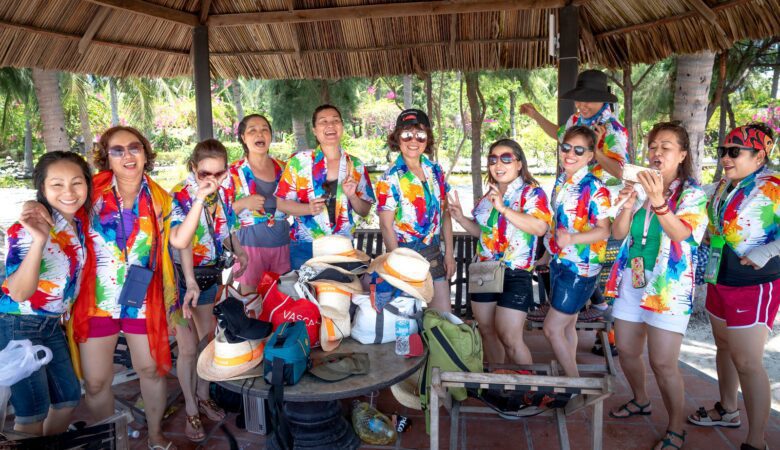Are you itching to pack your bags, but can’t decide whether to embark on a solo adventure or join forces with a group? Well, fret not! We’ve got you covered. In this blog post, we’re going to delve into the pros and cons of both group travel and solo travel. Whether you crave companionship or desire complete freedom, we’ll help you weigh the advantages and disadvantages of each option. So sit back, relax, and let’s uncover which type of travel suits your wanderlust best!
Advantages of Group Travel:
Cost-effective: One of the biggest advantages of group travel is cost-effectiveness. When you travel in a group, expenses such as accommodations, transportation, and even meals can be shared among the members. This means you’ll have more money to splurge on exciting activities or souvenirs!
Safety and Security: Safety is paramount when exploring unknown territories, and traveling with a group significantly reduces potential risks. With fellow travelers by your side, there’s strength in numbers. You can look out for each other while navigating unfamiliar destinations, ensuring a safer journey overall.
Socializing and Making New Friends: Group travel provides excellent opportunities for socializing and making new friends from different walks of life. Whether it’s sharing stories over dinner or bonding during adventurous excursions, you’ll create lasting memories with like-minded individuals who share your passion for exploration.
So why not consider joining a group tour next time? Not only will it save you some cash but also provide that extra layer of security throughout your trip. And let’s not forget about the incredible friendships waiting to be forged along the way! Stay tuned as we explore the disadvantages of group travel next…
– Cost-effective
When it comes to traveling, one of the biggest concerns for many people is the cost. It’s no secret that exploring new destinations can be quite expensive, especially when you factor in accommodation, transportation, meals, and activities. This is where group travel can really shine and provide a cost-effective solution.
By traveling with a group, you can split the expenses among everyone involved. From booking shared accommodations to sharing meals at local restaurants, there are plenty of opportunities to save money when you’re part of a larger group. Plus, many travel companies offer discounted rates for group bookings, allowing you to enjoy even more savings.
Not only does group travel help reduce costs but it also provides an added sense of security. When you’re traveling alone, there may be instances where you need to hire private transportation or pay extra for safety measures like hiring a guide or staying in secure accommodations. However, when you’re part of a group tour or excursion, these additional expenses are often included in the package price.
In addition to financial benefits,
traveling with others allows
for socializing and making new friends.
Exploring unfamiliar places together
creates lasting bonds as you share experiences,
laughter and create memories.
You never know who might become your lifelong friend through this journey!
Overall,
group travel offers numerous advantages
including its cost-effectiveness,
enhanced safety and security,
and the opportunity to meet new people.
While it may lack some flexibility and require compromises along the way,
the benefits outweigh the potential downsides.
So whether you choose solo adventure or opt for company on your travels,
remember that each option has its own unique pros and cons-
it all depends on what kind of experience you’re seeking!
– Safety and Security
Safety and security are paramount concerns when it comes to traveling. When you choose to go on a group trip, you can find comfort in the fact that there is safety in numbers. Being part of a group provides an extra layer of protection, especially if you’re traveling to unfamiliar or potentially dangerous destinations.
In a group setting, there’s always someone looking out for each other. You can rely on your fellow travelers to keep an eye on your belongings while you explore or help navigate tricky situations. Additionally, tour guides or organizers usually have extensive knowledge and experience in ensuring the safety of the entire group.
It’s also worth noting that traveling with others can offer emotional support and reassurance, which contributes to a greater sense of personal security. If any unfortunate incidents occur, having people around who can lend a hand or provide assistance is incredibly valuable.
However, it’s important not to solely rely on others for your own safety. Even within a group setting, it’s crucial to remain vigilant and take necessary precautions such as keeping personal belongings secure and being aware of your surroundings at all times.
While solo travel may lack the immediate security provided by traveling in groups, there are still ways to ensure personal safety. Researching about the destination beforehand and familiarizing yourself with local customs and potential risks will go a long way in preventing unnecessary mishaps.
Whether you choose group travel or solo travel depends on what level of security makes you feel most comfortable. Remember that no matter how well-prepared we are for our journeys, unexpected situations may arise – but being informed and alert will greatly contribute towards maintaining both physical and emotional wellbeing during your travels
– Socializing and Making New Friends
When it comes to group travel, one of the biggest advantages is the opportunity for socializing and making new friends. Traveling with a group allows you to meet like-minded individuals who share your passion for exploring new places. Whether you’re hiking through the mountains or lounging on a beach, having companions by your side can enhance the overall experience.
Group travel provides ample opportunities for bonding and creating lasting memories. You’ll have countless chances to strike up conversations, share laughs, and forge meaningful connections with people from all walks of life. From swapping travel stories over dinner to embarking on exciting excursions together, these shared experiences foster camaraderie among travelers.
Another benefit of traveling in a group is that it eliminates feelings of loneliness or isolation that solo travelers may encounter. Being part of a group means there’s always someone around to talk to or engage in activities with. This constant company not only increases safety but also offers comfort and support throughout the journey.
Moreover, joining a group allows you access to insider knowledge and local expertise from fellow travelers who may have visited your chosen destination before. They can provide valuable insights about must-see attractions, hidden gems off the beaten path, or even recommend great dining spots that are popular among locals.
In conclusion (not really concluding!), socializing and making new friends while traveling as part of a group adds an extra layer of enjoyment and enrichment to your trip. So if you thrive off human connection and crave shared experiences, then opting for group travel might be just what you need!
Disadvantages of Group Travel:
Lack of Flexibility
When you travel with a group, you have to consider the needs and preferences of everyone involved. This means that your itinerary may be more rigid and less adaptable to spontaneous changes. Want to take a detour or stay an extra day in a place that captures your interest? Well, tough luck! In a group setting, decisions are often made collectively, which can limit your ability to go with the flow.
Compromising on Personal Preferences
Traveling is all about immersing yourself in new experiences and following your own interests. However, when you’re part of a group, compromises become inevitable. You might find yourself visiting attractions or participating in activities that aren’t necessarily aligned with your personal desires. While compromise is essential for maintaining harmony within the group, it can sometimes leave you feeling unsatisfied.
Dealing with Different Personalities
In any group setting, there will always be varying personalities and dynamics at play. This can lead to conflicts arising from differences in opinions or communication styles. It’s important to remember that not everyone will see eye-to-eye all the time during group travel. Dealing with these interpersonal challenges requires patience and understanding but can still create moments of frustration along the way.
– Lack of Flexibility
One of the main drawbacks of group travel is the lack of flexibility it entails. When traveling with a group, you have to adhere to a set schedule and itinerary, leaving little room for spontaneous detours or changes in plans. This can be frustrating for those who prefer to go with the flow and explore at their own pace.
In a group setting, decisions are often made by consensus or based on the preferences of the majority. As a result, you may find yourself compromising on activities or destinations that don’t align with your personal interests. This can lead to feelings of dissatisfaction and missed opportunities.
Another aspect that limits flexibility in group travel is the need to synchronize everyone’s schedules and preferences. Coordinating different people’s timelines, availability, and individual preferences can be challenging and time-consuming. It requires compromise from all parties involved but may not always result in an ideal outcome for each individual.
Additionally, unforeseen circumstances such as weather conditions or transportation delays can disrupt carefully planned itineraries. In these situations, group travelers must adapt collectively rather than being able to make independent decisions.
While some people thrive on structure and enjoy having every detail organized for them during their trip, others crave more freedom and spontaneity when exploring new places. Solo travel offers greater flexibility in terms of choosing where to go next or how long to stay somewhere without needing approval from others.
While traveling with a group has its perks such as companionship and shared experiences; lack of flexibility remains one downside that might hinder certain individuals’ enjoyment of their journey
– Compromising on Personal Preferences
When it comes to group travel, one of the biggest challenges is compromising on personal preferences. Each individual has their own unique tastes, interests, and priorities. In a group setting, it’s inevitable that not everyone will want to do the same things or visit the same places.
For example, you might be an adventure junkie who loves adrenaline-pumping activities like bungee jumping or white-water rafting. However, your travel companions may prefer a more relaxed approach and opt for sightseeing or shopping instead.
In such situations, compromise becomes essential in order to maintain harmony within the group. You may have to give up some of your preferred activities in favor of something that appeals to everyone. This can sometimes feel like sacrificing your own desires for the sake of others.
Moreover, compromises are not limited to activities alone; they also extend to accommodation choices and dining preferences. Perhaps you prefer staying in budget accommodations while others prefer luxury hotels. Or maybe you’re a vegetarian but some members of your group are meat lovers.
While compromising can be challenging at times, it also allows for new experiences and broadens your horizons. It teaches you patience and understanding as you navigate through different perspectives and find common ground with fellow travelers.
Remember though – compromise doesn’t mean completely giving up what you want; rather it means finding middle ground where everyone feels satisfied. So embrace the opportunity to explore new possibilities even if they deviate from your initial plans!
In conclusion (Note: this sentence does not conclude), compromising on personal preferences is an inherent part of group travel dynamics. While it may require flexibility and open-mindedness from all parties involved, it ultimately fosters cooperation among travelers as they embark on shared adventures together!
– Dealing with Different Personalities
One of the downsides of group travel is that you’re bound to encounter a wide range of personalities. From the extroverted social butterfly to the introverted bookworm, everyone brings their own unique quirks and preferences to the table. While this can certainly add an element of excitement and diversity to your trip, it can also present some challenges.
There’s the issue of conflicting interests. What if one person wants to spend hours exploring ancient ruins while another just wants to relax on a sun-drenched beach? It can be difficult finding common ground and ensuring that everyone’s desires are met.
Then there’s the potential for clashes in communication styles. Some people may be more assertive, while others prefer a more passive approach. This difference in communication can sometimes lead to misunderstandings or misinterpretations.
Additionally, different personalities often have varying levels of tolerance for certain activities or situations. For example, someone might thrive in crowded cities bustling with energy, whereas another person may find it overwhelming and draining.
Let’s not forget about conflicts arising from differences in decision-making styles. One person may be spontaneous and impulsive, always eager for adventure at every turn. On the other hand, someone else might prefer careful planning and adherence to a strict itinerary.
It’s important when traveling as a group to remain open-minded and adaptable when dealing with various personalities. Learning effective communication skills will help navigate any disagreements that arise along the way.
Advantages of Solo Travel:
Complete Freedom and Flexibility
Solo travel offers unparalleled freedom and flexibility. You get to choose your own itinerary, explore at your own pace, and make spontaneous decisions without having to consider anyone else’s preferences or schedules. Want to spend an extra day exploring a hidden gem? No problem! Feel like changing your plans last minute? Go ahead! The world is truly your oyster when you’re traveling solo.
Self-discovery and Personal Growth
Embarking on a solo journey allows for deep self-reflection and personal growth. Without the distractions of familiar faces or the comfort of relying on others, you are forced to confront yourself head-on. This introspection can lead to powerful realizations about who you are as an individual, helping you gain a better understanding of your strengths, weaknesses, and aspirations.
Challenging Comfort Zones
Solo travel pushes you out of your comfort zones in ways that group travel may not necessarily do. It requires self-reliance, adaptability, and resilience as you navigate foreign environments alone. By facing new challenges head-on – whether it’s trying unfamiliar foods or navigating public transportation systems in foreign languages – you develop confidence in yourself and expand your horizons.
In the end, solo travel isn’t just about ticking off bucket list destinations; it’s about embarking on a transformative journey where you have complete control over every aspect of it. So go forth fearlessly into the unknown because there is so much waiting for you out there!
– Complete Freedom and Flexibility
One of the greatest advantages of solo travel is the complete freedom and flexibility it offers. When you’re traveling alone, you have the power to make all your decisions without any compromises or considerations for others. You get to choose where to go, what activities to indulge in, and how long to stay.
No more waiting for others to wake up or dragging yourself along on tours that don’t interest you. Solo travel allows you to create your own itinerary based on your personal interests and preferences. Whether you want to spend hours exploring ancient ruins or simply relax on a secluded beach, the choice is entirely yours.
Moreover, solo travel provides an opportunity for spontaneous adventures. If something catches your eye while wandering through a new city or if a local suggests an off-the-beaten-path attraction, there’s no need for lengthy discussions or negotiations with travel companions – you can just go with the flow!
Furthermore, being alone allows for self-reflection and introspection like no other experience can offer. Without distractions from others’ opinions or expectations, solo travelers have the chance to truly connect with themselves. It’s an opportunity for personal growth as one learns how capable they are of navigating unfamiliar territories independently.
Solo travel also pushes individuals out of their comfort zones by challenging them both mentally and emotionally. It encourages independence and self-reliance as travelers navigate through language barriers and cultural differences on their own.
In conclusion (although not conclusive), solo travel grants individuals unparalleled freedom and flexibility in crafting their perfect journey. So whether it’s exploring bustling cities or venturing into remote wildernesses, embarking on a solo adventure promises endless possibilities for self-discovery and unforgettable experiences!
– Self-discovery and Personal Growth
Solo travel offers a unique opportunity for self-discovery and personal growth. When you embark on a journey alone, you have the freedom to explore not only new places but also your own thoughts and emotions.
Without the distractions of others, you can truly focus on yourself and delve deep into introspection. This allows you to gain a better understanding of who you are as an individual, your strengths, weaknesses, and aspirations.
Traveling solo pushes you out of your comfort zone and challenges you in ways that group travel might not. Being solely responsible for planning your itinerary, navigating unfamiliar territories, and making decisions forces you to rely on yourself and develop problem-solving skills.
Moreover, solo travel encourages independence. You learn how to depend on yourself in challenging situations while gaining confidence in your abilities. As you navigate through different cultures and languages alone, it helps build resilience and adaptability.
Additionally, traveling by yourself provides ample opportunities for meeting new people from various backgrounds. Interacting with locals or fellow travelers can open doors to exciting conversations and cultural exchanges that enrich both parties involved.
Embarking on a solo adventure allows for immense personal growth as it enables individuals to step outside their comfort zones , overcome challenges independently , foster self-reliance ,and cultivate meaningful connections with others . Solo travel is truly transformative!
– Challenging Comfort Zones
Solo travel is undoubtedly an opportunity to step out of your comfort zone and experience personal growth like never before. When you embark on a solo adventure, there are no safety nets or familiar faces to rely on. You have to navigate unfamiliar territories and face challenges head-on.
The beauty of challenging your comfort zones lies in the incredible sense of accomplishment that follows. As you conquer new experiences, push past your limits, and overcome obstacles on your own, you’ll realize just how resilient and capable you truly are.
Solo travel allows for self-discovery on a profound level. It gives you the space and freedom to reflect upon yourself without any external influences or distractions. Whether it’s exploring a foreign city or immersing yourself in a different culture, solo travel helps you connect with your inner self in ways that group travel simply cannot replicate.
In addition to personal growth, solo travel also provides ample opportunities for building confidence and independence. From navigating public transportation systems to making important decisions all by yourself, each small victory along the way adds up to create a strong sense of empowerment.
While group travel certainly has its perks, there is something undeniably special about embarking on an adventure alone. The chance to challenge your comfort zones can lead to transformative experiences that stay with you long after the journey ends.
So whether it’s exploring ancient temples in Southeast Asia or hiking through rugged landscapes in South America, consider stepping out into the world as a solo traveler at least once in your life—it may just be one of the most rewarding things you ever do!








